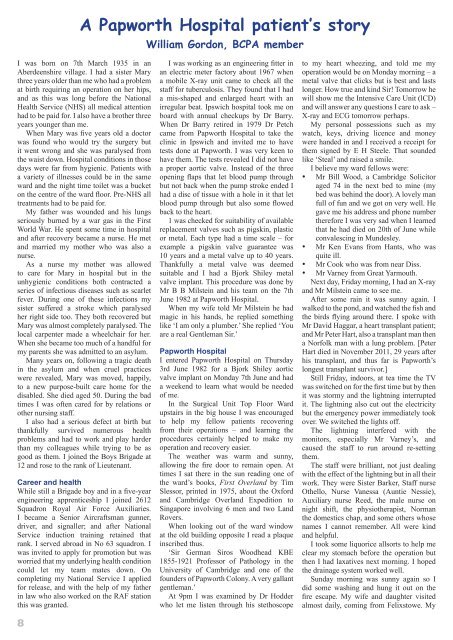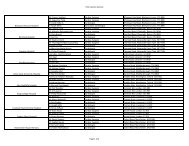BCPA Journal - Issue 184 - British Cardiac Patients Association
BCPA Journal - Issue 184 - British Cardiac Patients Association
BCPA Journal - Issue 184 - British Cardiac Patients Association
You also want an ePaper? Increase the reach of your titles
YUMPU automatically turns print PDFs into web optimized ePapers that Google loves.
8<br />
A Papworth Hospital patient’s story<br />
I was born on 7th March 1935 in an<br />
Aberdeenshire village. I had a sister Mary<br />
three years older than me who had a problem<br />
at birth requiring an operation on her hips,<br />
and as this was long before the National<br />
Health Service (NHS) all medical attention<br />
had to be paid for. I also have a brother three<br />
years younger than me.<br />
When Mary was five years old a doctor<br />
was found who would try the surgery but<br />
it went wrong and she was paralysed from<br />
the waist down. Hospital conditions in those<br />
days were far from hygienic. <strong>Patients</strong> with<br />
a variety of illnesses could be in the same<br />
ward and the night time toilet was a bucket<br />
on the centre of the ward floor. Pre-NHS all<br />
treatments had to be paid for.<br />
My father was wounded and his lungs<br />
seriously burned by a war gas in the First<br />
World War. He spent some time in hospital<br />
and after recovery became a nurse. He met<br />
and married my mother who was also a<br />
nurse.<br />
As a nurse my mother was allowed<br />
to care for Mary in hospital but in the<br />
unhygienic conditions both contracted a<br />
series of infectious diseases such as scarlet<br />
fever. During one of these infections my<br />
sister suffered a stroke which paralysed<br />
her right side too. They both recovered but<br />
Mary was almost completely paralysed. The<br />
local carpenter made a wheelchair for her.<br />
When she became too much of a handful for<br />
my parents she was admitted to an asylum.<br />
Many years on, following a tragic death<br />
in the asylum and when cruel practices<br />
were revealed, Mary was moved, happily,<br />
to a new purpose-built care home for the<br />
disabled. She died aged 50. During the bad<br />
times I was often cared for by relations or<br />
other nursing staff.<br />
I also had a serious defect at birth but<br />
thankfully survived numerous health<br />
problems and had to work and play harder<br />
than my colleagues while trying to be as<br />
good as them. I joined the Boys Brigade at<br />
12 and rose to the rank of Lieutenant.<br />
Career and health<br />
While still a Brigade boy and in a five-year<br />
engineering apprenticeship I joined 2612<br />
Squadron Royal Air Force Auxiliaries.<br />
I became a Senior Aircraftsman gunner,<br />
driver, and signaller; and after National<br />
Service induction training retained that<br />
rank. I served abroad in No 63 squadron. I<br />
was invited to apply for promotion but was<br />
worried that my underlying health condition<br />
could let my team mates down. On<br />
completing my National Service I applied<br />
for release, and with the help of my father<br />
in law who also worked on the RAF station<br />
this was granted.<br />
William Gordon, <strong>BCPA</strong> member<br />
I was working as an engineering fitter in<br />
an electric meter factory about 1967 when<br />
a mobile X-ray unit came to check all the<br />
staff for tuberculosis. They found that I had<br />
a mis-shaped and enlarged heart with an<br />
irregular beat. Ipswich hospital took me on<br />
board with annual checkups by Dr Barry.<br />
When Dr Barry retired in 1979 Dr Petch<br />
came from Papworth Hospital to take the<br />
clinic in Ipswich and invited me to have<br />
tests done at Papworth. I was very keen to<br />
have them. The tests revealed I did not have<br />
a proper aortic valve. Instead of the three<br />
opening flaps that let blood pump through<br />
but not back when the pump stroke ended I<br />
had a disc of tissue with a hole in it that let<br />
blood pump through but also some flowed<br />
back to the heart.<br />
1 was checked for suitability of available<br />
replacement valves such as pigskin, plastic<br />
or metal. Each type had a time scale – for<br />
example a pigskin valve guarantee was<br />
10 years and a metal valve up to 40 years.<br />
Thankfully a metal valve was deemed<br />
suitable and I had a Bjork Shiley metal<br />
valve implant. This procedure was done by<br />
Mr B B Milstein and his team on the 7th<br />
June 1982 at Papworth Hospital.<br />
When my wife told Mr Milstein he had<br />
magic in his hands, he replied something<br />
like ‘I am only a plumber.’ She replied ‘You<br />
are a real Gentleman Sir.’<br />
Papworth Hospital<br />
I entered Papworth Hospital on Thursday<br />
3rd June 1982 for a Bjork Shiley aortic<br />
valve implant on Monday 7th June and had<br />
a weekend to learn what would be needed<br />
of me.<br />
In the Surgical Unit Top Floor Ward<br />
upstairs in the big house I was encouraged<br />
to help my fellow patients recovering<br />
from their operations – and learning the<br />
procedures certainly helped to make my<br />
operation and recovery easier.<br />
The weather was warm and sunny,<br />
allowing the fire door to remain open. At<br />
times I sat there in the sun reading one of<br />
the ward’s books, First Overland by Tim<br />
Slessor, printed in 1975, about the Oxford<br />
and Cambridge Overland Expedition to<br />
Singapore involving 6 men and two Land<br />
Rovers.<br />
When looking out of the ward window<br />
at the old building opposite I read a plaque<br />
inscribed thus.<br />
‘Sir German Siros Woodhead KBE<br />
1855-1921 Professor of Pathology in the<br />
University of Cambridge and one of the<br />
founders of Papworth Colony. A very gallant<br />
gentleman.’<br />
At 9pm I was examined by Dr Hodder<br />
who let me listen through his stethoscope<br />
to my heart wheezing, and told me my<br />
operation would be on Monday morning – a<br />
metal valve that clicks but is best and lasts<br />
longer. How true and kind Sir! Tomorrow he<br />
will show me the Intensive Care Unit (lCD)<br />
and will answer any questions I care to ask –<br />
X-ray and ECG tomorrow perhaps.<br />
My personal possessions such as my<br />
watch, keys, driving licence and money<br />
were handed in and I received a receipt for<br />
them signed by E H Steele. That sounded<br />
like ‘Steal’ and raised a smile.<br />
I believe my ward fellows were:<br />
• Mr Bill Wood, a Cambridge Solicitor<br />
aged 74 in the next bed to mine (my<br />
bed was behind the door). A lovely man<br />
full of fun and we got on very well. He<br />
gave me his address and phone number<br />
therefore I was very sad when I learned<br />
that he had died on 20th of June while<br />
convalescing in Mundesley.<br />
• Mr Ken Evans from Hants, who was<br />
quite ill.<br />
• Mr Cook who was from near Diss.<br />
• Mr Varney from Great Yarmouth.<br />
Next day, Friday morning, I had an X-ray<br />
and Mr Milstein came to see me.<br />
After some rain it was sunny again. I<br />
walked to the pond, and watched the fish and<br />
the birds flying around there. I spoke with<br />
Mr David Haggar, a heart transplant patient;<br />
and Mr Peter Hart, also a transplant man then<br />
a Norfolk man with a lung problem. [Peter<br />
Hart died in November 2011, 29 years after<br />
his transplant, and thus far is Papworth’s<br />
longest transplant survivor.]<br />
Still Friday, indoors, at tea time the TV<br />
was switched on for the first time but by then<br />
it was stormy and the lightning interrupted<br />
it. The lightning also cut out the electricity<br />
but the emergency power immediately took<br />
over. We switched the lights off.<br />
The lightning interfered with the<br />
monitors, especially Mr Varney’s, and<br />
caused the staff to run around re-setting<br />
them.<br />
The staff were brilliant, not just dealing<br />
with the effect of the lightning but in all their<br />
work. They were Sister Barker, Staff nurse<br />
Othello, Nurse Vanessa (Auntie Nessie),<br />
Auxiliary nurse Reed, the male nurse on<br />
night shift, the physiotherapist, Norman<br />
the domestics chap, and some others whose<br />
names I cannot remember. All were kind<br />
and helpful.<br />
I took some liquorice allsorts to help me<br />
clear my stomach before the operation but<br />
then I had laxatives next morning. I hoped<br />
the drainage system worked well.<br />
Sunday morning was sunny again so I<br />
did some washing and hung it out on the<br />
fire escape. My wife and daughter visited<br />
almost daily, coming from Felixstowe. My



